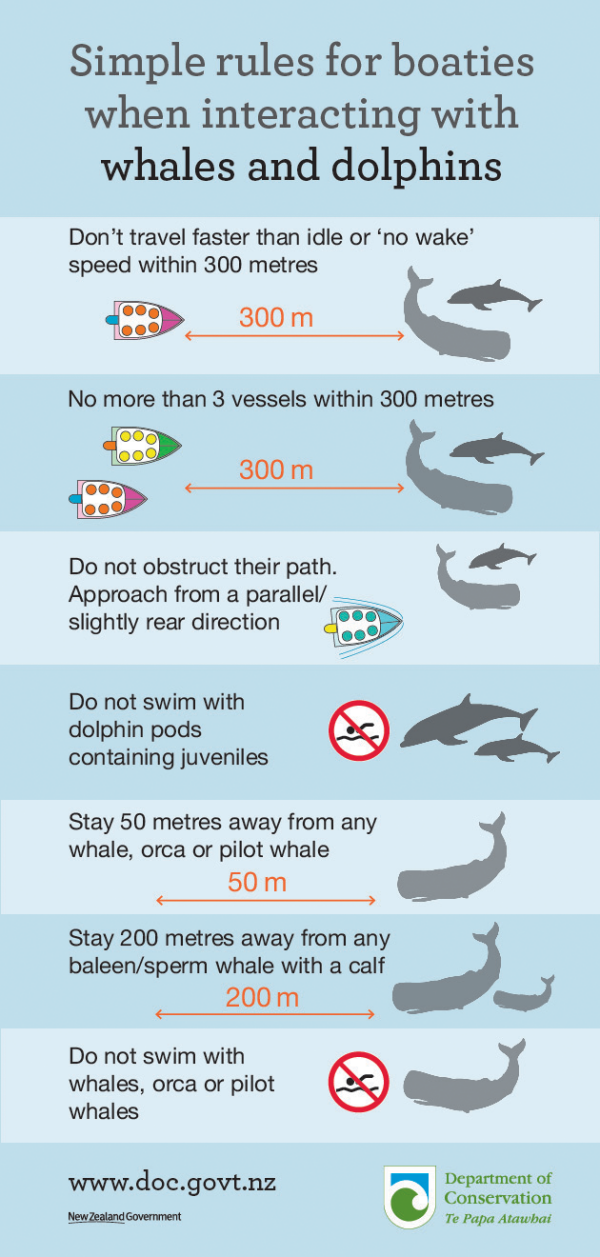Background
Here at Akaroa Dolphins, our mission is to give an authentic, personal and luxurious harbour nature cruise, with a focus on enriching the environment and community.
As a holder of a New Zealand Department of Conservation Marine Mammal Viewing Permit, we are legally authorized to take guests on dolphin and seal viewing tours. We are proud to be one of only two year-round operators in Akaroa Harbour with this permit, so we encourage you to choose responsibly.
In Akaroa Harbour, a moratorium is in place, preventing the issuance of new permits for viewing or swimming with marine mammals. Nevertheless, there exist a few unlawful operators operating without permits. This moratorium is primarily aimed at safeguarding Hector's dolphins, backed by scientific research. Unfortunately, the Department of Conservation (DOC) lacks the resources required to effectively enforce its licensing regulations. When you purchase a ticket for Akaroa Dolphins, a portion of the proceeds is dedicated to supporting research and educational efforts concerning the endangered Hector's dolphins and other marine mammals that inhabit Akaroa Harbour and New Zealand. These unlicensed operators often charge the same or even higher prices per ticket, exerting unnecessary pressure on our cherished taonga (treasures) and, in the process, violating the law.
What is the aim of the SMART programme?
The SMART course, an acronym for 'Sustainable Marine Mammal Actions in Recreation and Tourism', aims to raise awareness of the rules for vessels around marine mammals. Promoting responsible behaviour, by helping skippers assess the behaviour of seals, dolphins and whales they encounter, so they can make appropriate decisions when interacting with them.
Why are we a SMART operator?
Akaroa Dolphins understands the obligation we have to this unique and special environment, in and around Akaroa Harbour. It is important for the ongoing success of our business and for the love of our peninsula, that our activities have a positive impact on the environment.
We chose to be a SMART operator because we are passionate about being leaders in sustainable marine mammal viewing, providing a quality experience while educating our customers. We have achieved this through intensive staff training, responsible advertising and education.
We’re committed to raising awareness of our distinctive environment by developing and demonstrating the best practice possible, encouraging fellow recreational boats to learn from us along the way. Being a permitted Department of Conservation SMART operator, we do this by operating in a sensitive and responsible manner around dolphins, whales and seals, to ensure we have minimal impact on the environment and wildlife.
Who is involved?
SMART (Sustainable Marine Mammal Actions in Recreation and Tourism) is a voluntary collaboration between commercial boat operators and DOC (Department of Conservation) for the protection of marine mammals in New Zealand, under the Marine Mammal Protection Regulations 1992.
When did the course start?
The course started in 2014, and we are still one in a small number of businesses to be a member. However, we hope it will become more popular. For businesses viewing marine mammals, we believe being a SMART operator should be a ‘must’ have, rather than a ‘could’ have.
Where is it acknowledged?
The goal is that this SMART Operator programme will eventually become recognised all-over New Zealand and targeted by 'green-tourists'. With the protection of our sea life becoming more important worldwide, the more tourists that look for reassurance that their experience is eco-friendly and sustainable, these are the customers we hope to attract to our business.
How can we all prevent our potential impact on marine mammals?
Overall, we need to ensure that the operating rules in the Marine Mammals Protection regulations are followed, along with the conditions outlined in commercial permits. Of course, it is then down to observing the best practice when viewing marine mammals, in which our rules are displayed below.
How boats must approach whales & dolphins at sea?
- Ensure that you travel no faster than idle or ‘no wake’ speed within 300 m of any marine mammal.
- Approach whales and dolphins from a parallel/slightly rear direction.
- Do not circle them, obstruct their path or cut through any group.
- Keep at least 50 m from whales & Orca (or 200 m from any baleen/sperm whale mother and calf or calves).
- Swimming with whales or Orca is not permitted.
- Do not swim with dolphin pods containing juveniles.
- Avoid approaching closer than 20 m to seals and sea lions hauled out onshore.
- Idle slowly away. Speed may be gradually increased to out-distance dolphins and should not exceed 10 knots within 300 m of any dolphin.

Interacting with Marine Mammal Rules
Other general rules:
- Do not disturb, harass or make loud noises near marine mammals.
- Contact should be ceased should marine mammals show any signs of becoming disturbed or alarmed.
- Do not feed or throw any rubbish near marine mammals.
- Avoid sudden or repeated changes in speed or direction of any vessel or aircraft near a marine mammal.
- There should be no more than 3 vessels and/or aircraft within 300 m of any marine mammal
To find out more visit https://www.doc.govt.nz/our-work/smart-operator-programme/